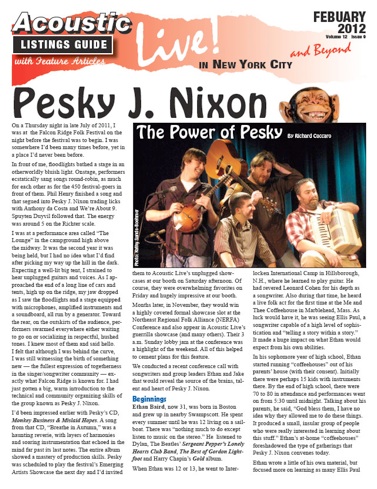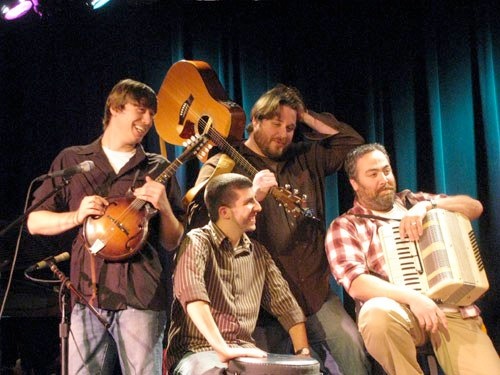Pesky J Nixon
The Power of Pesky
By Richard Cuccaro
On a Thursday night in late July of 2011, I was at the Falcon Ridge Folk Festival on the night before the festival was to begin. I was somewhere I’d been many times before, yet in a place I’d never been before.
In front of me, floodlights bathed a stage in an otherworldly bluish light. Onstage, performers ecstatically sang songs round-robin, as much for each other as for the 450 festival-goers in front of them. Phil Henry finished a song and that segued into Pesky J. Nixon trading licks with Anthony da Costa and We’re About 9. Spuyten Duyvil followed that. The energy was around 5 on the Richter scale.
I was at a performance area called “The Lounge” in the campground high above the midway. It was the second year it was being held, but I had no idea what I’d find after picking my way up the hill in the dark. Expecting a well-lit big tent, I strained to hear unplugged guitars and voices. As I approached the end of a long line of cars and tents, high up on the ridge, my jaw dropped as I saw the floodlights and a stage equipped with microphones, amplified instruments and a soundboard, all run by a generator. Toward the rear, on the outskirts of the audience, performers swarmed everywhere either waiting to go on or socializing in respectful, hushed tones. I knew most of them and said hello. I felt that although I was behind the curve, I was still witnessing the birth of something new — the fullest expression of togetherness in the singer/songwriter community — exactly what Falcon Ridge is known for. I had just gotten a big, warm introduction to the technical and community organizing skills of the group known as Pesky J. Nixon.
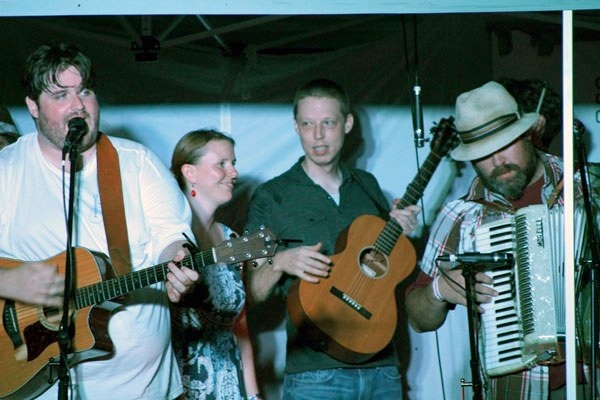
I’d been impressed earlier with Pesky’s CD, Monkey Business & Mislaid Hopes. A song from that CD, “Breathe in Autumn,” was a haunting reverie, with layers of harmonies and soaring instrumentation that echoed in the mind far past its last notes. The entire album showed a mastery of production skills. Pesky was scheduled to play the festival’s Emerging Artists Showcase the next day and I’d invited them to Acoustic Live’s unplugged showcases at our booth on Saturday afternoon. Of course, they were overwhelming favorites on Friday and hugely impressive at our booth.
Months later, in November, they would win a highly coveted formal showcase slot at the Northeast Regional Folk Alliance (NERFA) Conference and also appear in Acoustic Live’s guerrilla showcase (and many others). Their 3 a.m. Sunday lobby jam at the conference was a highlight of the weekend. All of this helped to cement plans for this feature.
We conducted a recent conference call with songwriters and group leaders Ethan and Jake that would reveal the source of the brains, talent and heart of Pesky J. Nixon.
Beginnings
Ethan Baird, now 31, was born in Boston and grew up in nearby Swampscott. He spent every summer until he was 12 living on a sailboat. There was “nothing much to do except listen to music on the stereo.” He listened to Dylan, The Beatles’ Sergeant Pepper’s Lonely Hearts Club Band, The Best of Gordon Lightfoot and Harry Chapin’s Gold album.
When Ethan was 12 or 13, he went to Interlocken International Camp in Hillsborough, N.H., where he learned to play guitar. He had revered Leonard Cohen for his depth as a songwriter. Also during that time, he heard a live folk act for the first time at the Me and Thee Coffeehouse in Marblehead, Mass. As luck would have it, he was seeing Ellis Paul, a songwriter capable of a high level of sophistication and “telling a story within a story.” It made a huge impact on what Ethan would expect from his own abilities.
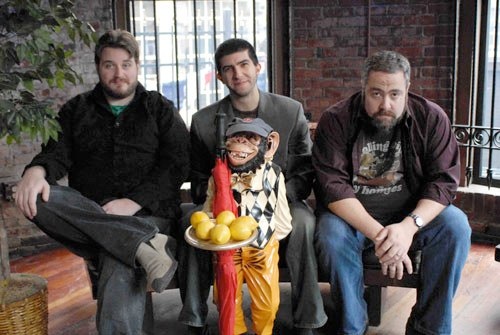
In his sophomore year of high school, Ethan started running “coffeehouses” out of his parents’ house (with their consent). Initially there were perhaps 15 kids with instruments there. By the end of high school, there were 70 to 80 in attendance and performances went on from 5:30 until midnight. Talking about his parents, he said, “God bless them, I have no idea why they allowed me to do these things. It produced a small, insular group of people who were really interested in learning about this stuff.” Ethan’s at-home “coffeehouses” foreshadowed the type of gatherings that Pesky J. Nixon convenes today.
Ethan wrote a little of his own material, but focused more on learning as many Ellis Paul and Martin Sexton songs as he could, plus some acoustic versions of pop material. In his sophomore year of high school, he started his own a cappella group that he named “Swingtown.” That continued until he graduated in 1998. When he got to college at Brandeis University in Boston, he said, “It was absurd, how popular a cappella groups were.”
Jake Bush grew up in Queensbury, N.Y., near Lake George, about an hour north of Albany. His early experience with music included piano instruction when he was 5, with a “severe teacher” not unlike Miss Havisham in Dickens’ Great Expectations. Her house was big and dark with lace curtains. He can’t quite recall, but thinks he might’ve gotten rapped on the knuckles with a ruler if his hands weren’t positioned correctly. He wanted to quit after six months, but his mom convinced him to try studying with another teacher who had just moved to town and whose reputation included the term “wonderful.” She must have been, since Jake studied with her for the next 10 years.
From seventh grade through high school, Jake was always in the school choruses and orchestra. Some friends played drums and guitar, so he did “the garage band thing” for a while. He played electric piano and the band did mostly covers. The few originals that he and his band mates wrote were, as Jake said, “crap.”
Jake’s first attempt at solo songwriting occurred as he was riding a ski chairlift and was about a girl he was dating. He went over the verses and chorus in his head all day as he went up and down the mountain. Later, he wrote the lyrics down in the blank pages at the end of a book he was reading. A friend helped him finish it but, again, it was “crap,” he said. Recently he found an old notebook in the bench of the family’s piano in which he’d written songs during his teen years. He claims to have burned it.
Jake had a checkered college career at Brandeis University, enrolling and dropping out, then re-enrolling and dropping out again. His primary focus was singing with the university’s a cappella group, Spur of the Moment. He’d left the first time, worked odd jobs back home, then went back for a year and then dropped out again. He said he “wasn’t mentally prepared for college.” Oddly, his chosen major was psychology. [Could’ve been mine, too.]
After leaving college, Jake spent time singing “semi-professionally” with the a cappella groups Altavoz for two years and Six Appeal (later renamed Playback), also for two years.
Ethan Meets Jake
In the spring of 1998 Jake had left Brandeis again but Spur of the Moment “quietly” kept him on until they could hold auditions. Not a student, he was technically not allowed to be a member of the group, but he was too valuable to let go, so they kept him on. In the fall of ’98, he didn’t have a vote, but was asked to give his opinion during auditions. Enter Ethan. On the second day of his freshman year, Ethan auditioned for Spur of the Moment and easily made the group. He and Jake became friends. Ethan’s major in college was English Literature and Music Composition but, as Ethan explains it, his parents told him that his major was actually “a cappella.” There were enormous chunks of time spent practicing and the group’s performances were frequent (three to four practices a week for three hours each and 15 performances per semester). The group had to organize and arrange their own music and put out one CD every year (all self-funded). Ethan took charge here, moving all 20 singers in the group into his parents’ house to record in his home studio. He won national awards for his production work.
Ethan moved away from the Boston area after graduation, settling in western Massachusetts. He got away from playing music but did some producing. One of his post-graduation productions was the very fine album Lighthouse by singer/songwriter Chris O’Brien.
A Helpful Shove and a Parting Gift
Ethan also worked at the Pioneer Arts Center in Easthampton, Mass. There, he met singer/songwriter Andrea Coller, who ran the open mics at the Center. As Ethan described her, “She had a wry and sarcastic sense of humor and, at the same time, she was a fierce member of the songwriting community in western Massachusetts.” He continued, “I started volunteering as sound guy at the open mics and the two of us became close friends. She was the kind of songwriter who would write two fantastic songs a week and she just intimidated the heck out of me, but at the same time she was remarkably warm and nurturing when it came to helping folks bring out the songwriters in themselves. She kind of battered me into playing the open mic and after a while I started sneaking originals in when I thought no one was paying attention, but she could always tell. Unfortunately she died after a third fight with cancer at age 28. Our plaster monkey butler Newman, that is in most of our press shots and the monkey of Monkey Business & Mislaid Hopes, is something I inherited from her. The day after she passed away she was published in Glamour magazine’s annual non-fiction writing contest [a heart-wrenching story of her battle with cancer]. Before she passed, she and I talked as I started putting together Pesky with Jake and Dan and was in a lot of ways an honorary fourth member.”
Pesky J. Nixon has been working with a non-profit called the SAMFund, a foundation that raises money for young adult cancer survivors to help them pay their post-treatment bills. Pesky’s benefit events have brought in more than $10,000. When Andrea passed away, Pesky and the foundation started a grant in Andrea’s name. Their second benefit show is scheduled for June 16, at Church of Boston.
Forming the Band
When Ethan moved back to the Boston area, he wanted to start a band and called Jake. Jake said, “Well, I’m already in an a cappella group, but I’ll start another one if you want.” Ethan responded, “I’m done with a cappella … instruments this time.”
Emerging from the heart of Red Sox Nation, the band chose its name from three Red Sox icons. “Pesky” is for Johnny Pesky, former player, coach and manager, “J” is for Jason Varitek and “Nixon” stands for Trot Nixon.
Dan Carp, a drummer, had been friends with Jake from their days in summer camp. He proved to be a perfect fit for the group. The child of a bassist father and drummer mother, Dan studied bass and drums for almost 10 years before focusing his attention on percussion when he reached college. At the University of Pennsylvania, he sang with the Jewish a cappella group R’nanah and performed Gilbert and Sullivan musicals with the Penn Singers. In his first studio experience, he provided percussion on a project with pop singer John Legend. In grad school, he played percussion in the orchestra for musicals. Along the way, Dan developed an appreciation for world drums (Afrobeat, traditional and modern Indian, ska/reggae). He also traveled to the Middle East and received formal training on the tabla. As a cornerstone founding member of the group, Dan runs counter to the stereotypical view of drummers. He’s their most organized member, keeping track of important logistics for practice and gigs.
For portability and a focus on roots-based music, adjustments had to be made. Dan got rid of his drum kit fairly quickly and became a good djembe player. It took Jake about a year to accept a switch from piano to accordion. Ethan continued playing guitar, since Jake said, teasingly, “He was the most stubborn.”
Breaking Through at “The Ridge”
The group marks its progress with its yearly trips to Falcon Ridge Folk Festival. “Falcon Ridge has always been a defining period for the year for us,” Ethan stated. At their first Falcon Ridge in 2007, they were essentially just three guys practicing. Back home, they were playing one show every four to five months at small cafes, just for the sake of having a gig. No one of consequence really heard their songs until their second Falcon Ridge.
In 2008, at Pesky’s second Falcon Ridge, things changed. Seeking to meet other musicians, Anthony da Costa, Abbie Gardner and, coincidentally, Chris O’Brien, whose CD Ethan had produced, came upon the Pesky campsite. Anthony played a couple of his songs and then asked the members of Pesky to sing. As soon as he heard their a cappella-honed harmonies, he said, “Let me introduce you around.” He then took them to meet all the key personalities in the campground. Among them was Gordon Nash, who books the Budgiedome campsite shows at Falcon Ridge. They also got to meet Brian Gundersdorf, Katie Graybeal and Pat Klink of We’re About 9, who came over to their campsite the next night. Ironically, it was We’re About 9 that Ethan had pointed out as a model for Pesky when it formed — “There’s this trio that writes great songs and sings great harmony.” — Ethan recalled saying … and here they were, soon to become their cohorts in a burgeoning career. During the following year, Pesky shared gigs with Anthony and We’re About 9, doing four to five shows. Ethan calls it “the world’s slowest world tour.” They would do one show in Boston; two months later they would do one show in Worcester; three months later they would do one show in Springfield. During this time, Pesky’s popularity rose, because Anthony and We’re About 9 were telling their fan bases, ‘Hey, pay attention to these guys.”
Another member joined the group when Ethan decided that he, Dan and Jake should attend the “Americana Ensemble” music classes that Boston folk club Passim runs once each week. One of the two instructors was mandolin impresario Eric McDonald, a Berklee graduate. Ethan talked Eric into joining them in the studio while recording Monkey Business & Mislaid Hopes, then got him to join the band.
Two years ago, Pesky played its first show at Passim with the We’re About 9 duo (Brian and Katie). They had a gig there and invited Pesky to be the other half of a co-bill. From that point forward, Pesky received a lot of airplay for Monkey Business from Boston’s premier folk radio station, WUMB-FM, raising its profile even higher. NERFA and Falcon Ridge recognition followed.
The Birth of “The Lounge”
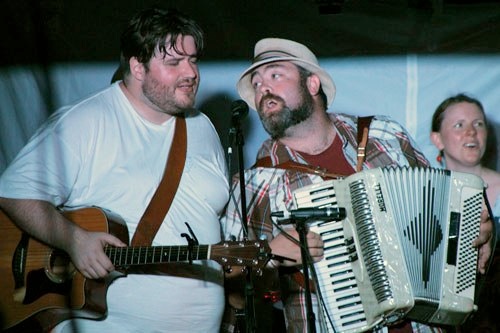
After 2009, the year of the near-tornado touchdown at Falcon Ridge, artistic director Anne Saunders needed to shorten the festival from four days — Thursday through Sunday — to three days — Friday through Sunday. For Ethan and Jake, this was not an option. Ethan said, ”Falcon Ridge is too involved. The idea of going to Falcon Ridge for two-and-a-half days … I can’t even wrap my brain around it.” They decided to run a stage during the hours that Thursday’s main stage would’ve operated — from 4 to around 10:30 p.m.
Ethan credits Scott Jones as the “technical mastermind” behind pulling off The Lounge stage. A former radio DJ with an engineering background, Scott was the startled next-door neighbor of Ethan’s parents when Ethan brought the a cappella singers home (he was deathly afraid he’d moved next to a frat house). He became an ardent Pesky supporter.
Scott had heard about the Falcon Ridge Folk Festival from Ethan and Jake and decided to attend with his wife and five children, setting up camp with the Pesky J. Nixon crew. Prior to doing The Lounge, he recorded the campsite singing for his own enjoyment. When they decided to create The Lounge stage, Ethan and Scott pooled their equipment, the bulk of it coming from Scott. In 2010, Ethan told Scott optimistically, “Don’t expect more than 60 to 80 people.” When festival security personnel showed up at 10:30, complimenting the music, Ethan was shocked to hear them say that 300 people came to that first Lounge. In 2011, with 900 people admitted by Thursday, 450 attended The Lounge shows.
Pesky’s Plans
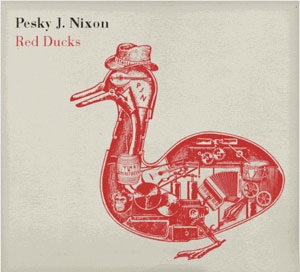
Ethan hopes to become more involved in community action using what he calls “tribal mischief,” a formal and informal art of social engineering. We assume it involves music and humor and that musician friends will be involved. One thing is for certain. If Pesky J. Nixon is there, we don’t want to miss it.
Website: peskyjnixon.com
Upcoming shows:
Mar 13 7pm The Living Room, NYC, John Platt’s On Your Radar $12
30 Lizard Lounge, Cambridge MA CD Release show for Red Ducks
April 21 8pm Caffe Lena, Saratoga Springs, NY $16
May 19 8pm Cafe Veritas, Rochester, NY $12

